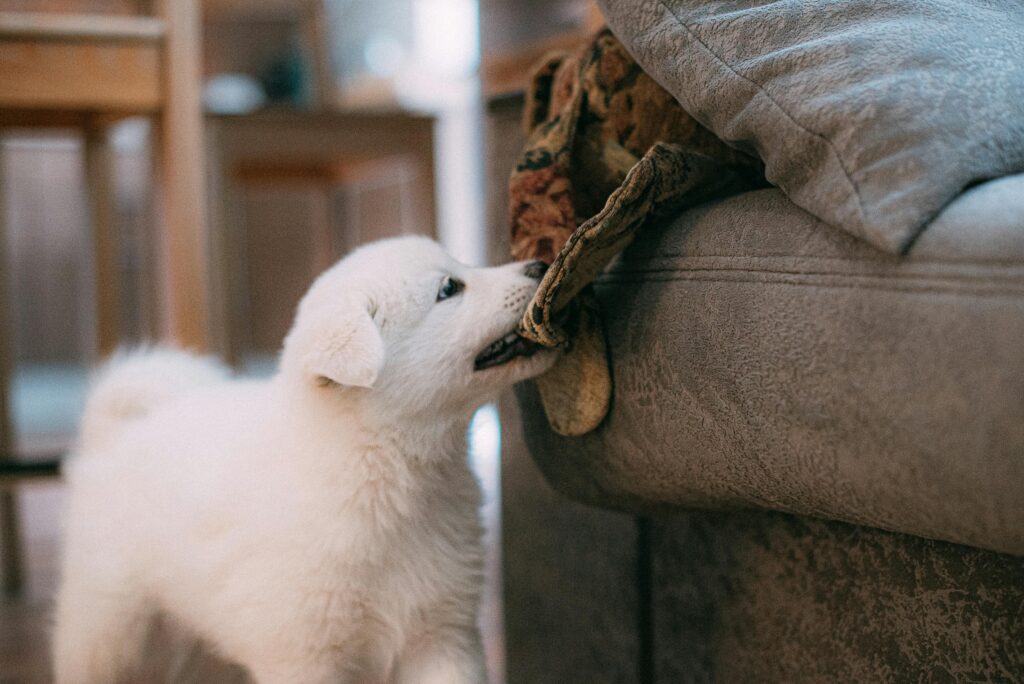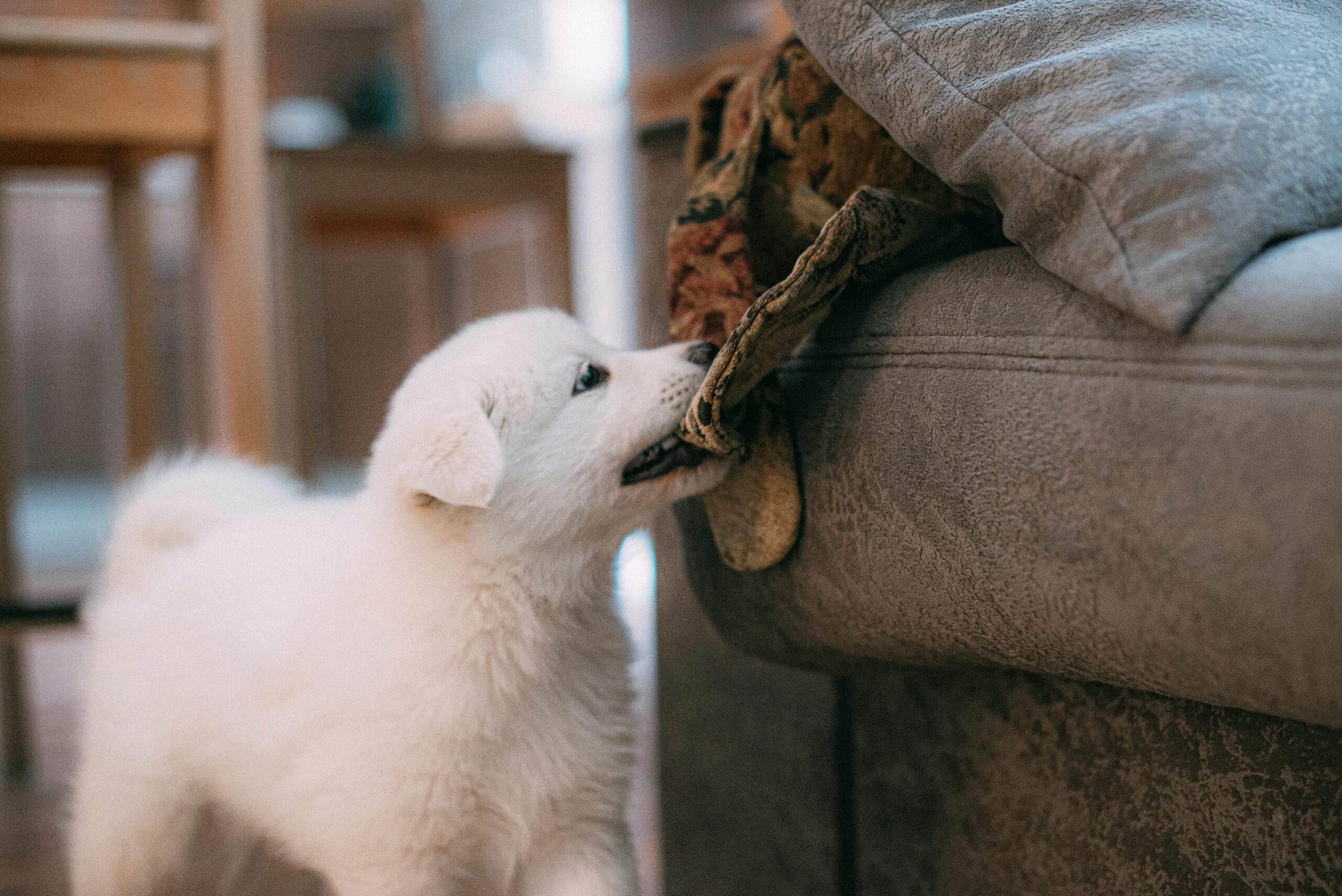Puppies are adorable bundles of energy, but one of the most frustrating behaviors they exhibit is biting. While puppy biting is normal and a part of how they explore the world, it’s important to teach them that biting humans is unacceptable. Without proper training, your puppy’s nipping can turn into a bad habit that will be harder to correct as they grow.
In this guide, we’ll walk you through proven strategies to stop puppy biting while fostering a calm and well-mannered pet. With the right approach, you can redirect this behavior and ensure that your puppy grows into a well-behaved adult dog.

Table of Contents
- Why Puppies Bite
- When to Start Training a Puppy to Stop Biting
- How to Stop Puppy Biting: Step-by-Step Guide
- Common Mistakes to Avoid
- How Long Does It Take to Stop Puppy Biting?
- Conclusion: Download Our Free eBook
Why Puppies Bite
Before we dive into the solutions, it’s important to understand why puppies bite. Biting is a natural behavior for puppies, and there are a few common reasons why they do it:
- Teething: Puppies begin teething at around 3 to 6 months, and chewing helps alleviate the discomfort.
- Exploration: Puppies explore the world with their mouths. Biting is a way for them to investigate their surroundings.
- Play Behavior: Biting is part of how puppies play with their littermates. When they nip too hard, their siblings yelp, teaching the puppy about boundaries.
- Attention Seeking: Sometimes puppies bite to get your attention, especially if they are feeling bored or overstimulated.
Although puppy biting is natural, it’s crucial to teach them that human skin is off-limits.
When to Start Training a Puppy to Stop Biting
It’s best to start teaching bite inhibition as soon as you bring your puppy home, typically around 8 weeks of age. Early training will prevent this behavior from becoming a bigger problem later on.
At this stage, your puppy is learning social behaviors, and you can take advantage of their curiosity and willingness to learn by introducing proper boundaries. The earlier you start, the faster they’ll catch on.
How to Stop Puppy Biting: Step-by-Step Guide
1. Teach Bite Inhibition
One of the most effective ways to stop puppy biting is to teach bite inhibition. When puppies play with their littermates, they learn how to control the force of their bite. You can mimic this training by letting out a high-pitched “ouch” when your puppy bites too hard, then immediately stop playing. This signals to your puppy that biting ends the fun.
2. Redirect to Chew Toys
Puppies, especially when teething, need appropriate objects to chew on. Offer them a variety of chew toys, and every time they try to bite your hands or feet, gently redirect them to a toy instead. This helps them understand what is acceptable to chew and what isn’t.
3. Use Positive Reinforcement
Positive reinforcement is key to successful training. When your puppy plays nicely without biting, reward them with praise, treats, or extra playtime. Puppies respond well to rewards, and this will help reinforce good behavior. Remember to give the reward immediately so they associate it with the desired action.
4. Socialization
Allow your puppy to interact with other puppies and well-behaved adult dogs. This will help them learn bite inhibition naturally as older dogs will correct them if they bite too hard. Puppy socialization classes are a great way to expose your puppy to a controlled, safe environment where they can learn important social skills.
5. Be Consistent
Consistency is crucial when training your puppy. Make sure everyone in your household follows the same rules and methods for addressing biting. If one person allows the puppy to nip at them while others don’t, it will confuse the puppy and slow down their learning process.
6. Avoid Physical Punishment
Never hit or physically punish your puppy for biting. This can lead to fear and aggression, worsening the problem. Instead, focus on positive reinforcement and redirection to correct the behavior.
7. Use Time-Outs
If your puppy continues to bite even after redirecting to a toy or offering treats, you can use a brief time-out. Stop all interaction with your puppy and ignore them for 30-60 seconds. This helps them understand that biting stops all attention and playtime. Be sure to reward them when they calm down and stop biting.
Common Mistakes to Avoid
Training a puppy to stop biting takes patience and consistency. Here are some common mistakes to avoid:
- Inconsistent Rules: Ensure that everyone in the household follows the same rules regarding biting. Inconsistency will confuse your puppy.
- Encouraging Rough Play: Avoid encouraging rough play with your puppy. Using your hands as playthings will teach your puppy that biting is acceptable.
- Punishing After the Fact: If your puppy bites, avoid scolding them after the fact. Puppies have short attention spans and won’t connect the punishment with the bite, leading to confusion and stress.
How Long Does It Take to Stop Puppy Biting?
The timeline for stopping puppy biting varies depending on your puppy’s age, breed, and personality. With consistent training, many puppies begin to reduce their biting by 4-6 months of age. However, some may take longer, especially if they are highly energetic or teething.
Patience and persistence are key. Keep using positive reinforcement and redirection, and remember that every puppy learns at their own pace.
Conclusion: Get Additional Help with Our Free eBook
Stopping puppy biting takes time, but with the right techniques and consistency, your puppy will learn to play and interact without using their teeth. By teaching bite inhibition, redirecting to chew toys, and using positive reinforcement, you’ll be able to shape your puppy’s behavior effectively.
For more in-depth advice and expert tips, download our free eBook today! It’s filled with step-by-step guidance to help you train your puppy and tackle any behavioral challenges you may face.
FAQs
- Why does my puppy bite so much?
Puppies bite due to teething, play behavior, and exploration. It’s natural, but they need to be taught not to bite humans. - When should I start teaching my puppy to stop biting?
You can start training your puppy to stop biting as early as 8 weeks old. Early training is key to preventing bad habits. - How do I teach my puppy not to bite?
Use techniques like bite inhibition, positive reinforcement, and redirection to chew toys to teach your puppy not to bite. - How long does it take to stop puppy biting?
Most puppies stop biting by 4-6 months with consistent training, but some may take longer, depending on their temperament. - What if my puppy bites even when I use toys?
If your puppy continues to bite, use brief time-outs by stopping play or ignoring them for a short time to discourage biting.
